
List of British monarchs
Encyclopedia
There have been 12 monarchs of Great Britain
and the United Kingdom
(the Monarchy of the United Kingdom
). The united kingdom of Great Britain was formed on 1 May 1707 with the merger of the Kingdom of England
and the Kingdom of Scotland
, which had been in personal union
under the House of Stuart
since 24 March 1603. On 1 January 1801, Great Britain merged with the Kingdom of Ireland
to form the United Kingdom of Great Britain and Ireland
. After most of Ireland left the union on 6 December 1922, its name was amended on 12 April 1927 to the United Kingdom of Great Britain and Northern Ireland
.
, passed by the Parliament of England
. In return for access to the English plantations in North America, the Hanoverian succession and the Union were ratified by the Parliament of Scotland
in 1707.
After the death of Anne with no living children, George I, the son of Sophia of Hanover
, granddaughter of James VI of Scotland and I of England through his daughter Elizabeth of Bohemia
, was the closest Protestant heir to the throne.
was adopted in 1917, during the First World War. It was changed from Saxe-Coburg-Gotha
because of wartime anti-German sentiment in the United Kingdom.
Kingdom of Great Britain
The former Kingdom of Great Britain, sometimes described as the 'United Kingdom of Great Britain', That the Two Kingdoms of Scotland and England, shall upon the 1st May next ensuing the date hereof, and forever after, be United into One Kingdom by the Name of GREAT BRITAIN. was a sovereign...
and the United Kingdom
United Kingdom
The United Kingdom of Great Britain and Northern IrelandIn the United Kingdom and Dependencies, other languages have been officially recognised as legitimate autochthonous languages under the European Charter for Regional or Minority Languages...
(the Monarchy of the United Kingdom
Monarchy of the United Kingdom
The monarchy of the United Kingdom is the constitutional monarchy of the United Kingdom and its overseas territories. The present monarch, Queen Elizabeth II, has reigned since 6 February 1952. She and her immediate family undertake various official, ceremonial and representational duties...
). The united kingdom of Great Britain was formed on 1 May 1707 with the merger of the Kingdom of England
Kingdom of England
The Kingdom of England was, from 927 to 1707, a sovereign state to the northwest of continental Europe. At its height, the Kingdom of England spanned the southern two-thirds of the island of Great Britain and several smaller outlying islands; what today comprises the legal jurisdiction of England...
and the Kingdom of Scotland
Kingdom of Scotland
The Kingdom of Scotland was a Sovereign state in North-West Europe that existed from 843 until 1707. It occupied the northern third of the island of Great Britain and shared a land border to the south with the Kingdom of England...
, which had been in personal union
Personal union
A personal union is the combination by which two or more different states have the same monarch while their boundaries, their laws and their interests remain distinct. It should not be confused with a federation which is internationally considered a single state...
under the House of Stuart
House of Stuart
The House of Stuart is a European royal house. Founded by Robert II of Scotland, the Stewarts first became monarchs of the Kingdom of Scotland during the late 14th century, and subsequently held the position of the Kings of Great Britain and Ireland...
since 24 March 1603. On 1 January 1801, Great Britain merged with the Kingdom of Ireland
Kingdom of Ireland
The Kingdom of Ireland refers to the country of Ireland in the period between the proclamation of Henry VIII as King of Ireland by the Crown of Ireland Act 1542 and the Act of Union in 1800. It replaced the Lordship of Ireland, which had been created in 1171...
to form the United Kingdom of Great Britain and Ireland
United Kingdom of Great Britain and Ireland
The United Kingdom of Great Britain and Ireland was the formal name of the United Kingdom during the period when what is now the Republic of Ireland formed a part of it....
. After most of Ireland left the union on 6 December 1922, its name was amended on 12 April 1927 to the United Kingdom of Great Britain and Northern Ireland
United Kingdom
The United Kingdom of Great Britain and Northern IrelandIn the United Kingdom and Dependencies, other languages have been officially recognised as legitimate autochthonous languages under the European Charter for Regional or Minority Languages...
.
House of Stuart
| Name | |Portrait | |Birth | |Marriages | |Death | Claim |
|---|---|---|---|---|---|
| Anne Anne of Great Britain Anne ascended the thrones of England, Scotland and Ireland on 8 March 1702. On 1 May 1707, under the Act of Union, two of her realms, England and Scotland, were united as a single sovereign state, the Kingdom of Great Britain.Anne's Catholic father, James II and VII, was deposed during the... 1 May 1707 Acts of Union 1707 The Acts of Union were two Parliamentary Acts - the Union with Scotland Act passed in 1706 by the Parliament of England, and the Union with England Act passed in 1707 by the Parliament of Scotland - which put into effect the terms of the Treaty of Union that had been agreed on 22 July 1706,... –1 August 1714 |
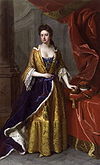 |
6 February 1665 St. James's Palace daughter of James II and Anne Hyde Anne Hyde Anne Hyde was the first wife of James, Duke of York , and the mother of two monarchs, Mary II of England and Scotland and Anne of Great Britain.... |
George of Denmark George of Denmark Prince George of Denmark and Norway, Duke of Cumberland was the husband of Anne, Queen of Great Britain.His marriage to Anne was arranged in the early 1680s with a view to developing an Anglo-Danish alliance to contain Dutch maritime power. As a result, George was unpopular with his Dutch... St. James's Palace 28 July 1683 17 children |
1 August 1714 Kensington Palace aged 49 |
daughter of James II (cognatic primogeniture; Bill of Rights 1689 Bill of Rights 1689 The Bill of Rights or the Bill of Rights 1688 is an Act of the Parliament of England.The Bill of Rights was passed by Parliament on 16 December 1689. It was a re-statement in statutory form of the Declaration of Right presented by the Convention Parliament to William and Mary in March 1689 ,... ) |
House of Hanover
The Hanoverian succession came about as a result of the Act of Settlement 1701Act of Settlement 1701
The Act of Settlement is an act of the Parliament of England that was passed in 1701 to settle the succession to the English throne on the Electress Sophia of Hanover and her Protestant heirs. The act was later extended to Scotland, as a result of the Treaty of Union , enacted in the Acts of Union...
, passed by the Parliament of England
Parliament of England
The Parliament of England was the legislature of the Kingdom of England. In 1066, William of Normandy introduced a feudal system, by which he sought the advice of a council of tenants-in-chief and ecclesiastics before making laws...
. In return for access to the English plantations in North America, the Hanoverian succession and the Union were ratified by the Parliament of Scotland
Parliament of Scotland
The Parliament of Scotland, officially the Estates of Parliament, was the legislature of the Kingdom of Scotland. The unicameral parliament of Scotland is first found on record during the early 13th century, with the first meeting for which a primary source survives at...
in 1707.
After the death of Anne with no living children, George I, the son of Sophia of Hanover
Sophia of Hanover
Sophia of the Palatinate was an heiress to the crowns of England and Ireland and later the crown of Great Britain. She was declared heiress presumptive by the Act of Settlement 1701...
, granddaughter of James VI of Scotland and I of England through his daughter Elizabeth of Bohemia
Elizabeth of Bohemia
Elizabeth of Bohemia was the eldest daughter of King James VI and I, King of Scotland, England, Ireland, and Anne of Denmark. As the wife of Frederick V, Elector Palatine, she was Electress Palatine and briefly Queen of Bohemia...
, was the closest Protestant heir to the throne.
| Name | |Portrait | |Birth | |Marriages | |Death | |Succession right | |References |
|---|---|---|---|---|---|---|
| George I George I of Great Britain George I was King of Great Britain and Ireland from 1 August 1714 until his death, and ruler of the Duchy and Electorate of Brunswick-Lüneburg in the Holy Roman Empire from 1698.... 1 August 1714 – 11 June 1727 |
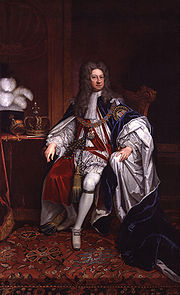 |
28 May 1660 Leineschloss Leineschloss The Leineschloss , situated on the Leine in Hanover, Germany, is the former residence of the Hanoverian kings and the current seat of the Landtag of Lower Saxony.... son of Ernest Augustus, Elector of Brunswick-Lüneburg Ernest Augustus, Elector of Brunswick-Lüneburg Ernest Augustus was duke of Brunswick-Lüneburg and ruled over the Principality of Calenberg subdivision of the duchy. He was appointed prince-elector, but died before the appointment became effective... and Sophia of Hanover Sophia of Hanover Sophia of the Palatinate was an heiress to the crowns of England and Ireland and later the crown of Great Britain. She was declared heiress presumptive by the Act of Settlement 1701... |
Sophia Dorothea of Brunswick-Lueneburg-Celle Sophia Dorothea of Celle Sophia Dorothea of Brunswick and Lunenburg was the wife and cousin of George Louis, Elector of Hanover, later George I of Great Britain, and mother of George II through an arranged marriage of state, instigated by the machinations of Duchess Sophia of Hanover... 21 November 1682 2 children |
11 June 1727 Osnabrück Osnabrück Osnabrück is a city in Lower Saxony, Germany, some 80 km NNE of Dortmund, 45 km NE of Münster, and some 100 km due west of Hanover. It lies in a valley penned between the Wiehen Hills and the northern tip of the Teutoburg Forest... aged 67 |
son of Sophia of Hanover Sophia of Hanover Sophia of the Palatinate was an heiress to the crowns of England and Ireland and later the crown of Great Britain. She was declared heiress presumptive by the Act of Settlement 1701... , granddaughter of James I & VI James I of England James VI and I was King of Scots as James VI from 24 July 1567 and King of England and Ireland as James I from the union of the English and Scottish crowns on 24 March 1603... |
|
| George II George II of Great Britain George II was King of Great Britain and Ireland, Duke of Brunswick-Lüneburg and Archtreasurer and Prince-elector of the Holy Roman Empire from 11 June 1727 until his death.George was the last British monarch born outside Great Britain. He was born and brought up in Northern Germany... 11 June 1727 – 25 October 1760 |
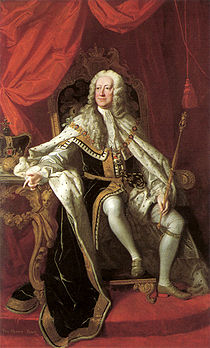 |
30 October 1683 Herrenhausen Herrenhausen Herrenhausen is an area of the German city Hanover which is most notable for the baroque Herrenhausen Gardens.Ernest Augustus, Elector of Brunswick-Lüneburg died in Herrenhausen Castle and his grandson King George II of Great Britain was born there. During the Second World War the castle was... son of George I George I of Great Britain George I was King of Great Britain and Ireland from 1 August 1714 until his death, and ruler of the Duchy and Electorate of Brunswick-Lüneburg in the Holy Roman Empire from 1698.... and Sophia Dorothea of Brunswick-Lueneburg-Celle Sophia Dorothea of Celle Sophia Dorothea of Brunswick and Lunenburg was the wife and cousin of George Louis, Elector of Hanover, later George I of Great Britain, and mother of George II through an arranged marriage of state, instigated by the machinations of Duchess Sophia of Hanover... |
Caroline of Ansbach Caroline of Ansbach Caroline of Brandenburg-Ansbach was the queen consort of King George II of Great Britain.Her father, John Frederick, Margrave of Brandenburg-Ansbach, was the ruler of a small German state... 22 August 1705 8 children |
25 October 1760 Kensington Palace Kensington Palace Kensington Palace is a royal residence set in Kensington Gardens in the Royal Borough of Kensington and Chelsea in London, England. It has been a residence of the British Royal Family since the 17th century and is the official London residence of the Duke and Duchess of Cambridge, the Duke and... aged 76 |
son of the preceding | |
| George III George III of the United Kingdom George III was King of Great Britain and King of Ireland from 25 October 1760 until the union of these two countries on 1 January 1801, after which he was King of the United Kingdom of Great Britain and Ireland until his death... 25 October 1760 – 29 January 1820 |
4 June 1738 Norfolk House Norfolk House Norfolk House, at 31 St James's Square, London, was built in 1722 for the Duke of Norfolk. It was a royal residence for a short time only, when Frederick, Prince of Wales, father of King George III, lived there 1737-1741, after his marriage in 1736 to Princess Augusta of Saxe-Gotha, daughter of... son of Frederick, Prince of Wales Frederick, Prince of Wales Frederick, Prince of Wales was a member of the House of Hanover and therefore of the Hanoverian and later British Royal Family, the eldest son of George II and father of George III, as well as the great-grandfather of Queen Victoria... and Princess Augusta of Saxe-Gotha Princess Augusta of Saxe-Gotha Princess Augusta of Saxe-Gotha-Altenburg was Princess of Wales between 1736 and 1751, and Dowager Princess of Wales thereafter. She was one of only three Princesses of Wales who never became queen consort... |
Charlotte of Mecklenburg-Strelitz Charlotte of Mecklenburg-Strelitz Charlotte of Mecklenburg-Strelitz was the Queen consort of the United Kingdom as the wife of King George III... St James's Palace 8 September 1761 15 children |
29 January 1820 Windsor Castle Windsor Castle Windsor Castle is a medieval castle and royal residence in Windsor in the English county of Berkshire, notable for its long association with the British royal family and its architecture. The original castle was built after the Norman invasion by William the Conqueror. Since the time of Henry I it... aged 81 |
grandson of the preceding | ||
| George IV George IV of the United Kingdom George IV was the King of the United Kingdom of Great Britain and Ireland and also of Hanover from the death of his father, George III, on 29 January 1820 until his own death ten years later... 29 January 1820 – 26 June 1830 (Prince Regent Prince Regent A prince regent is a prince who rules a monarchy as regent instead of a monarch, e.g., due to the Sovereign's incapacity or absence .... since 1811) |
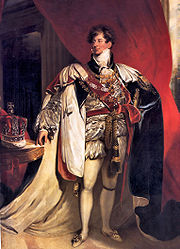 |
12 August 1762 St James's Palace son of George III and Charlotte of Mecklenburg-Strelitz Charlotte of Mecklenburg-Strelitz Charlotte of Mecklenburg-Strelitz was the Queen consort of the United Kingdom as the wife of King George III... |
(1) Maria Anne Fitzherbert Maria Anne Fitzherbert Maria Fitzherbert , was the woman with whom the future George IV secretly undertook a form of marriage, and his companion for a large part of his adult life. However the marriage in England was invalid under English civil laws concerning royal marriages... Park Lane Park Lane (road) Park Lane is a major road in the City of Westminster, in Central London.-History:Originally a country lane running north-south along what is now the eastern boundary of Hyde Park, it became a fashionable residential address from the eighteenth century onwards, offering both views across Hyde Park... 15 September 1785 (2) Caroline of Brunswick Caroline of Brunswick Caroline of Brunswick-Wolfenbüttel was the Queen consort of King George IV of the United Kingdom from 29 January 1820 until her death... St James's Palace 8 April 1795 1 daughter |
26 June 1830 Windsor Windsor, Berkshire Windsor is an affluent suburban town and unparished area in the Royal Borough of Windsor and Maidenhead in Berkshire, England. It is widely known as the site of Windsor Castle, one of the official residences of the British Royal Family.... aged 67 |
son of the preceding | |
| William IV William IV of the United Kingdom William IV was King of the United Kingdom of Great Britain and Ireland and of Hanover from 26 June 1830 until his death... 26 June 1830 – 20 June 1837 |
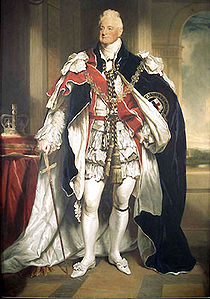 |
21 August 1765 Buckingham Palace Buckingham Palace Buckingham Palace, in London, is the principal residence and office of the British monarch. Located in the City of Westminster, the palace is a setting for state occasions and royal hospitality... son of George III and Charlotte of Mecklenburg-Strelitz Charlotte of Mecklenburg-Strelitz Charlotte of Mecklenburg-Strelitz was the Queen consort of the United Kingdom as the wife of King George III... |
Adelaide of Saxe-Meiningen Adelaide of Saxe-Meiningen Princess Adelaide of Saxe-Meiningen was the queen consort of the United Kingdom and of Hanover as spouse of William IV of the United Kingdom. Adelaide, the capital city of South Australia, is named after her.-Early life:Adelaide was born on 13 August 1792 at Meiningen, Thuringia, Germany... Kew Palace Kew Palace Kew Palace is a British Royal Palace in Kew Gardens on the banks of the Thames up river from London. There have been at least four Palaces at Kew, and three have been known as Kew Palace; the first building may not have been known as Kew as no records survive other than the words of another... 13 July 1818 2 children |
20 June 1837 Windsor Castle Windsor Castle Windsor Castle is a medieval castle and royal residence in Windsor in the English county of Berkshire, notable for its long association with the British royal family and its architecture. The original castle was built after the Norman invasion by William the Conqueror. Since the time of Henry I it... aged 71 |
brother of the preceding | |
| Victoria 20 June 1837 – 22 January 1901 |
 |
24 May 1819 Kensington Palace Kensington Palace Kensington Palace is a royal residence set in Kensington Gardens in the Royal Borough of Kensington and Chelsea in London, England. It has been a residence of the British Royal Family since the 17th century and is the official London residence of the Duke and Duchess of Cambridge, the Duke and... daughter of Prince Edward, Duke of Kent and Strathearn and Princess Victoria of Saxe-Coburg-Saalfeld Princess Victoria of Saxe-Coburg-Saalfeld Princess Victoria of Saxe-Coburg-Saalfeld was the mother of Queen Victoria of the United Kingdom.-Early life:... |
Albert of Saxe-Coburg and Gotha St James's Palace 10 February 1840 9 children |
22 January 1901 Osborne House Osborne House Osborne House is a former royal residence in East Cowes, Isle of Wight, UK. The house was built between 1845 and 1851 for Queen Victoria and Prince Albert as a summer home and rural retreat.... aged 81 |
niece of the preceding |
House of Saxe-Coburg and Gotha
Although he was the son and heir of Victoria, Edward VII inherited his father's names and is therefore counted as inaugurating a new royal house.| Name | |Portrait | |Birth | |Marriages | |Death | |Succession right | |References |
|---|---|---|---|---|---|---|
| Edward VII 22 January 1901 – 6 May 1910 |
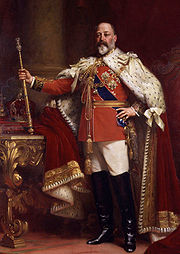 |
9 November 1841 Buckingham Palace Buckingham Palace Buckingham Palace, in London, is the principal residence and office of the British monarch. Located in the City of Westminster, the palace is a setting for state occasions and royal hospitality... son of Victoria Victoria of the United Kingdom Victoria was the monarch of the United Kingdom of Great Britain and Ireland from 20 June 1837 until her death. From 1 May 1876, she used the additional title of Empress of India.... and Prince Albert of Saxe-Coburg-Gotha |
Alexandra of Denmark Alexandra of Denmark Alexandra of Denmark was the wife of Edward VII of the United Kingdom... St George's Chapel 10 March 1863 6 children |
6 May 1910 Buckingham Palace Buckingham Palace Buckingham Palace, in London, is the principal residence and office of the British monarch. Located in the City of Westminster, the palace is a setting for state occasions and royal hospitality... aged 68 |
son of the preceding |
House of Windsor
The house name WindsorHouse of Windsor
The House of Windsor is the royal house of the Commonwealth realms. It was founded by King George V by royal proclamation on the 17 July 1917, when he changed the name of his family from the German Saxe-Coburg and Gotha to the English Windsor, due to the anti-German sentiment in the United Kingdom...
was adopted in 1917, during the First World War. It was changed from Saxe-Coburg-Gotha
House of Saxe-Coburg and Gotha
The House of Saxe-Coburg and Gotha is a German dynasty, the senior line of the Saxon House of Wettin that ruled the Ernestine duchies, including the duchy of Saxe-Coburg and Gotha....
because of wartime anti-German sentiment in the United Kingdom.
| Name | |Portrait | |Birth | |Marriages | |Death | |Succession right | |References |
|---|---|---|---|---|---|---|
| George V George V George V was king of the United Kingdom and its dominions from 1910 to 1936.George V or similar terms may also refer to:-People:* George V of Georgia * George V of Imereti * George V of Hanover... 6 May 1910 – 20 January 1936 |
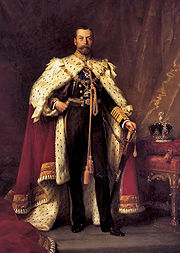 |
3 June 1865 Marlborough House Marlborough House Marlborough House is a mansion in Westminster, London, in Pall Mall just east of St James's Palace. It was built for Sarah Churchill, Duchess of Marlborough, the favourite and confidante of Queen Anne. The Duchess wanted her new house to be "strong, plain and convenient and good"... son of Edward VII and Alexandra of Denmark Alexandra of Denmark Alexandra of Denmark was the wife of Edward VII of the United Kingdom... |
Mary of Teck Mary of Teck Mary of Teck was the queen consort of the United Kingdom and the British Dominions, and Empress of India, as the wife of King-Emperor George V.... St James's Palace 6 July 1893 6 children |
20 January 1936 Sandringham House Sandringham House Sandringham House is a country house on of land near the village of Sandringham in Norfolk, England. The house is privately owned by the British Royal Family and is located on the royal Sandringham Estate, which lies within the Norfolk Coast Area of Outstanding Natural Beauty.-History and current... aged 70 |
son of the preceding | |
| Edward VIII 20 January – 11 December 1936 (abdicated) |
 |
23 June 1894 White Lodge son of George V George V of the United Kingdom George V was King of the United Kingdom and the British Dominions, and Emperor of India, from 6 May 1910 through the First World War until his death in 1936.... and Mary of Teck Mary of Teck Mary of Teck was the queen consort of the United Kingdom and the British Dominions, and Empress of India, as the wife of King-Emperor George V.... |
Wallis Warfield Simpson Château de Candé Château de Candé The Château de Candé is a castle located in the commune of Monts, Indre-et-Loire, 10 km to the south of Tours on the border of the département of Indre in France.... 3 June 1937 no children |
28 May 1972 Neuilly-sur-Seine Neuilly-sur-Seine Neuilly-sur-Seine is a commune in the western suburbs of Paris, France. It is located from the center of Paris.Although Neuilly is technically a suburb of Paris, it is immediately adjacent to the city and directly extends it. The area is composed of mostly wealthy, select residential... aged 77 |
son of the preceding | |
| George VI 11 December 1936 – 6 February 1952 |
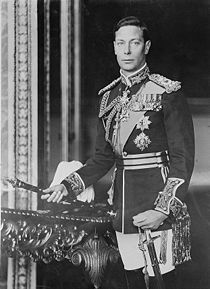 |
14 December 1895 Sandringham House Sandringham House Sandringham House is a country house on of land near the village of Sandringham in Norfolk, England. The house is privately owned by the British Royal Family and is located on the royal Sandringham Estate, which lies within the Norfolk Coast Area of Outstanding Natural Beauty.-History and current... son of George V George V of the United Kingdom George V was King of the United Kingdom and the British Dominions, and Emperor of India, from 6 May 1910 through the First World War until his death in 1936.... and Mary of Teck Mary of Teck Mary of Teck was the queen consort of the United Kingdom and the British Dominions, and Empress of India, as the wife of King-Emperor George V.... |
Elizabeth Bowes-Lyon Elizabeth Bowes-Lyon Elizabeth Angela Marguerite Bowes-Lyon was the queen consort of King George VI from 1936 until her husband's death in 1952, after which she was known as Queen Elizabeth The Queen Mother, to avoid confusion with her daughter, Queen Elizabeth II... Westminster Abbey Westminster Abbey The Collegiate Church of St Peter at Westminster, popularly known as Westminster Abbey, is a large, mainly Gothic church, in the City of Westminster, London, United Kingdom, located just to the west of the Palace of Westminster. It is the traditional place of coronation and burial site for English,... 26 April 1923 2 children |
6 February 1952 Sandringham House aged 56 |
brother of the preceding | |
| Elizabeth II 6 February 1952 – present |
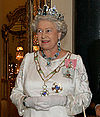 |
21 April 1926 Mayfair Mayfair Mayfair is an area of central London, within the City of Westminster.-History:Mayfair is named after the annual fortnight-long May Fair that took place on the site that is Shepherd Market today... daughter of George VI George VI of the United Kingdom George VI was King of the United Kingdom and the Dominions of the British Commonwealth from 11 December 1936 until his death... and Elizabeth Bowes-Lyon Elizabeth Bowes-Lyon Elizabeth Angela Marguerite Bowes-Lyon was the queen consort of King George VI from 1936 until her husband's death in 1952, after which she was known as Queen Elizabeth The Queen Mother, to avoid confusion with her daughter, Queen Elizabeth II... |
Philip of Greece and Denmark Prince Philip, Duke of Edinburgh Prince Philip, Duke of Edinburgh is the husband of Elizabeth II. He is the United Kingdom's longest-serving consort and the oldest serving spouse of a reigning British monarch.... Westminster Abbey Westminster Abbey The Collegiate Church of St Peter at Westminster, popularly known as Westminster Abbey, is a large, mainly Gothic church, in the City of Westminster, London, United Kingdom, located just to the west of the Palace of Westminster. It is the traditional place of coronation and burial site for English,... 20 November 1947 4 children |
Incumbent | daughter of the preceding |
See also
- Monarchy of the United KingdomMonarchy of the United KingdomThe monarchy of the United Kingdom is the constitutional monarchy of the United Kingdom and its overseas territories. The present monarch, Queen Elizabeth II, has reigned since 6 February 1952. She and her immediate family undertake various official, ceremonial and representational duties...
- List of British consorts
- List of monarchs in the British Isles
- Line of Succession to the British ThroneLine of succession to the British ThroneThe line of succession to the British throne is the ordered sequence of those people eligible to succeed to the throne of the United Kingdom and the other 15 Commonwealth realms. By the terms of the Act of Settlement 1701, the succession is limited to the descendants of the Electress Sophia of...
(a list of people) - Succession to the British ThroneSuccession to the British ThroneSuccession to the British throne is governed both by common law and statute. Under common law the crown is currently passed on by male-preference primogeniture. In other words, succession passes first to an individual's sons, in order of birth, and subsequently to daughters, again in order of birth....
(historical overview and current rules) - Alternative successions of the English crown
- English and French monarchs overlap chartEnglish and French monarchs overlap chartThis chart shows which monarchs of England and France reigned at the same time. This chart was created to help understand the progression of relations between these kingdoms because of the long rivalry between them over the centuries. France has had no monarchs since 1870...
- List of monarchs of the British Isles by cause of death
- Demise of the CrownDemise of the CrownIn relation to the shared monarchy of the Commonwealth realms and other monarchies, the demise of the Crown is the legal term for the end of a reign by a king, queen, or emperor, whether by death or abdication....
- Mnemonic verse of monarchs in EnglandMnemonic verse of monarchs in EnglandA mnemonic verse listing the monarchs ruling in England since William the Conqueror was traditionally used by English schoolchildren in the era when rote learning formed a major part of the curriculum....
- British monarchs' family treeBritish monarchs' family treeThis is the British monarchs' family tree, from James VI of Scotland to the present queen, Elizabeth II of the United Kingdom.-Before James VI/I:-House of Stuart:-House of Hanover:...
- List of longest-reigning British monarchs
- List of monarchs of British American colonies

